A chronology of the strengthening science on global warming -- and the United States' failure to address the issue.
Year | Science | Policy |
1988 | The United Nations Environmental Program and World Meteorological Organization create the Intergovernmental Panel on Climate Change (IPCC) to study global warming. During the hottest year on record, heat waves besiege countries around the globe. In America, wildfires rage in Yellowstone National Park, while extreme temperatures and drought kill an estimated 5,000 to 10,000 people. | On a hot summer day, Sen. Tim Wirth (D-Colo.) convenes congressional hearings on global warming. NASA climatologist James Hansen testifies about mankind's role in raising temperatures. Reporting on Hansen's testimony, journalist Philip Shabecoff writes a front page story on climate change for The New York Times. While running for president, George H.W. Bush promises to use the "White House effect" to battle the "greenhouse effect" during a campaign stop in Michigan. He pledges in that speech to convene a "global conference on the environment at the White House" during his first year in the White House; no such conference would take place. |
1990 | First IPCC Assessment issued. The report documents a 0.3-0.6 Celsius degree increase in average temperatures over the past 100 years, urges major cuts in carbon dioxide and methane emissions, and says "every effort should be made" to find substitutes for chlorofluorocarbons, a chemical refrigerant and solvent. | On Feb. 5, Bush emphasizes the "scientific uncertainty" about climate change at a global warming meeting. |
1992 | 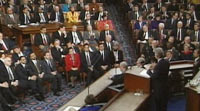 President Clinton proposes a "BTU" tax during his 1993 State of the Union speech. | Climate again becomes issue in the Presidential race, with Bill Clinton saying "our addiction to fossil fuels … is wrapping the earth in a deadly shroud of greenhouse gases" and urging Bush to commit the U.S. to a treaty on global warming. In Rio de Janeiro, Brazil, world leaders meet to discuss the terms of that treaty, the United Nations Framework Convention on Climate Change (UNFCCC), as well as other environmental issues. Bush reluctantly attends. Bush signs the treaty, which, in the eyes of critics, has been watered down to meet U.S. demands; it features voluntary goals for reducing greenhouse gas emissions, not firm limits. Pact aims to reduce emissions to 1990 levels by 2000. Bush submits treaty to the Senate, which votes to ratify the agreement. |
1993 | President Clinton launches Climate Change Action Plan, a collection of efforts that includes investments in energy-saving technologies, tree-planting programs and incentives designed to get car drivers onto public transit. The plan is intended to meet the terms of the Rio treaty. Clinton also proposes a "BTU tax" on the heat content of energy, but that program proves unpopular even with members of his own party and is not implemented. | |
1994 | The first version of the UNFCCC treaty, with voluntary emissions targets, goes into effect. | |
1995 | The Second IPCC Assessment states: "With the growth in atmospheric concentrations of greenhouse gases, interference with the climate system will grow in magnitude and the likelihood of adverse impacts from climate change … will become greater." The assessment goes on to say variations in atmospheric temperatures suggest "a discernible human influence on global climate," and it notes a 10-25 centimeter rise in sea levels over the past century. | The U.S. and other countries signed to the UNFCCC meet in Berlin to discuss implementing and updating the treaty. Worried about being overwhelmed by rising oceans, an alliance of small island nations calls for a 20 percent cut in greenhouse emissions. But conference delegates decide to spend two more years debating exactly how much to cut emissions. Pollster and political consultant Frank Luntz authors a policy memo to GOP leaders stating: "Should the public come to believe the scientific issues are settled, their views about global warming will change accordingly. Therefore, you need to continue to make the lack of scientific certainty a primary issue in the debate." |
1996 | Drilling deep into Greenland's ice sheet, scientists scrutinize 110,000-year-old ice cores and conclude the region "is roughly 20 degrees Celsius warmer than it once was." | |
1997 | 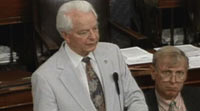 Sen. Robert Byrd (D-W.Va.) speaks on the Kyoto Protocol. | As the Clinton administration prepares for another round of negotiations on the UNFCCC, Senators Robert Byrd (D-W.Va.) and Chuck Hagel (R-Neb.) co-author a Senate resolution regarding the treaty. Adopted by a vote of 95-0, the resolution says the country shouldn't be party to any treaty that doesn't include tight emissions limits on developing countries as well as industrialized nations, or which "would result in serious harm to the economy of the United States." In December, the UNFCC settles on the Kyoto Protocol, which assigns firm greenhouse gas emission limits to signatory nations. The protocol is two-tiered, with different rules for poorer countries and wealthier ones. Essentially, it strengthens the original 1992 UNFCCC treaty agreed to in Brazil. Vice President Al Gore attends conference, and the U.S. signs on to agreement. But the move is purely symbolic: Gore and Clinton never submit the treaty to a vote in the U.S. Senate. Without the Senate's ratification, the treaty has no force in America. |
1998 | Conservative think tanks and energy industry insiders devise a plan to make climate change a "non-issue" and derail Kyoto and any "further initiatives" to thwart global warming. The New York Times reports on the strategy. | |
2000 | 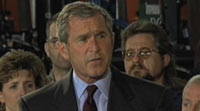 Candidate George W. Bush proposes mandatory emissions caps on the campaign trail. | Campaigning for president, Texas Governor George W. Bush pledges to cap carbon dioxide fumes and require power plants to reduce greenhouse gas emissions "within a reasonable period of time." |
2001 | The third IPCC Assessment offers more grim news, stating: "Globally it is very likely that the 1990s was the warmest decade, and 1998 was the warmest year" since records were kept. Consequences of this trend include a likely ten-percent decrease in snow cover since the 1960s, and an increase in the frequency and severity of El Ni�o weather events. The assessment continues: "There is new and stronger evidence that most of the warming observed over the last 50 years is attributable to human activities." | President Bush chooses Christine Todd Whitman to serve as EPA administrator. At a meeting on climate change in Trieste, Italy, Whitman says the President is planning to cap CO2 emissions in the U.S. and takes the same position on a CNN talk show. "There is a real problem that we as a world face from global warming," she tells CNN. 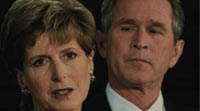 Republican senators, including Chuck Hagel, send a letter to Bush asking whether the president intends to regulate carbon emissions. In response to the letter, the president reverses his campaign stance and says he won't place a cap on CO2. The Bush administration allegedly suppresses the U.S. National Assessment of the Potential Consequences of Climate Variability and Change, a government report described by one researcher as the "most comprehensive" analysis of the possible effects of global warming on this nation. |
2002 | On the Antarctic peninsula, the Larsen B ice shelf -- a vast frozen terrain bigger than Rhode Island -- collapses, sending thousands of icebergs out to sea. Warming temperatures are apparently responsible. The U.S. Global Change Research Project reports: "Continuing growth in greenhouse gas emissions is likely to lead to annual-average warming over the United States that could be as much as several degrees Celsius (roughly 3-9 degrees Farenheit) during the 21st century. In addition, both precipitation and evaporation are projected to increase, and occurrences of unusual warmth and extreme wet and dry conditions are expected to become more frequent." 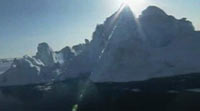 | According to government whistleblower Rick Piltz and emails obtained by Greenpeace through the Freedom of Information Act, Phil Cooney, a former oil industry lobbyist working for the White House Council on Environmental Quality, edits government scientific reports. His revisions downplay concerns about global warming. |
2003 | A deadly summer heat wave moves across Europe, killing more than 30,000 people. With temperatures 20-30 percent higher than normal, it's the worst disaster to strike Europe in 50 years. | The Commonwealth of Massachusetts sues the EPA in a bid to force the agency to regulate greenhouse pollutants. Connecticut, Illinois, Maine, New Jersey, New Mexico, New York, Rhode Island, Vermont and California back the Massachusetts suit; Michigan, Texas, Idaho, North Dakota, Utah, South Dakota, Alaska, Kansas, Nebraska and Ohio oppose it. |
2004 | Published in the journal Nature, an international study predicts climate change could wipe out huge numbers of animal species by 2050. The researchers believe as many as 1 million species could perish. The Arctic Climate Impact Assessment, an international effort to understand the effects of climate change on the region, concludes that warming is "likely to threaten the survival" of polar bears and seals living on artic ice. | |
2005 | In northern Canada, the Ayles ice shelf splinters into a giant ice island. Hurricane Katrina, the costliest disaster in U.S. history, levels large swaths of Louisiana and Mississippi and sends flood waters spilling over Alabama, Mississippi, Florida, Tennessee, Kentucky, Indiana and Ohio. The toll: approximately 1,833 lives lost and $125 billion in destruction. | Rick Piltz resigns from federal Climate Change Science Program, protesting the intrusion of politics into the scientific arena, notably the editing by Phil Cooney. Piltz goes on to testify before Congress at a hearing on the alleged politicization of science by Bush administration officials. Cooney resigns once his actions are exposed by the media. Shortly therafter he takes a position with ExxonMobil. |
2006 | An extensive study, published in the journal Nature, links global warming to the extinction of more than 65 South and Central American frog species. Scientists theorize that increased temperatures helped foster bacteria that killed off the amphibians. | NASA climate expert James Hansen, one of the world's leading authorities on global warming, tells the New York Times the administration is trying to gag him. 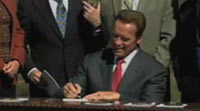 In California, Republican Governor Arnold Schwarzenegger signs landmark anti-warming legislation capping CO2 pollution at 1990 levels by 2020. |
2007 | "Observational evidence from all continents and most oceans shows that natural systems are being affected by regional climate changes, particularly temperature increases," finds the IPCC's Fourth Assessment. The report catalogs an array of worrisome observations: It appears lakes and rivers are heating up; the seas are becoming more acidic; vegetation is spreading towards the poles; and spring is arriving earlier. Over the past five years, the report notes, "much more evidence" has emerged tying these sorts of ecological changes to human-caused warming. | The Senate holds hearings with United States Climate Action Partnership, a group of businesses and leading environmental organizations calling on the federal government to quickly enact strong national legislation to require significant reductions of greenhouse gas emissions. The U.S. Supreme Court rules 5-4 against the EPA in the suit brought by Massachusetts in 2003, deciding that greenhouse gases can be regulated as pollutants under the Clean Air Act. Justice John Paul Stevens, writing for the majority, declares, "EPA has offered no reasoned explanation for its refusal to decide whether greenhouse gases cause or contribute to climate change." |
- RELATED LINKS
- Billion Dollar Weather Disasters
A government Web site tracking the history of major weather disasters in the United States - International Panel on Climate Change
Source for the four major assessments released by the U.N. scientific body since 1990.
A.C. Thompson is a reporter with the Center for Investigative Reporting.
home + introduction + watch online + reports + timeline + interviews + map + join the discussion
correspondent's chat + site map + readings & links + dvd/vhs & transcript + press reaction + credits
privacy policy + journalistic guidelines + FRONTLINE series home + wgbh + pbs
posted april 24, 2007
FRONTLINE is a registered trademark of wgbh educational foundation.
earth photo illustration copyright © corbis
web site copyright WGBH educational foundation






